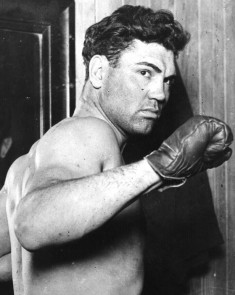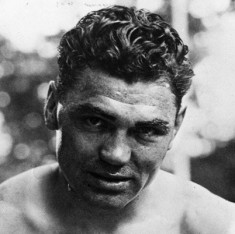| Jack Dempsey | |
|---|---|
 |
|
| Boxer | |
| Born | June 24, 1895 Manassa, Colorado |
| Died | May 31, 1983 (at age 87) New York City, New York |
| Nationality | American |
Jack Dempsey (1895-1983) was an American boxer. He was the heavyweight world champion for seven years, and at his peak, he was one of the most famous celebrities in the United States. Born William Harrison Dempsey, he was known for his tremendous punching strength.
One of his fights was the first in history to bring in a gate of over one million dollars. Dempsey has been inducted into multiple Boxing Halls of Fame, and he was named the best boxer of the first half of the 20th century in 1951.
Early Life
Dempsey was born in Manassa, Colorado, on June 24, 1895. He was the youngest child in a large Mormon family, which was rather poor due to his father’s lack of employment. For this reason, Jack only went to school until the age of eight, when he began to be employed to tend crops on the farm.
He was devoted to his family, but by the time he was a teenager, he was growing tired of this life. At the age of 16, he left home to seek a better life in Utah. He had serious trouble finding work or even shelter. He lived in camps for homeless people and earned enough to live simply by fighting for money in local bars.
Making a Name
Dempsey took the nickname “Kid Blackie” and he quickly became well-known on the unlicensed boxing scene. He realized that boxing, rather than bar brawling, might give him the chance to make a legitimate living, and so he turned professional. It was at about this time that he first used the name Jack.
He began knocking out his opponents in six of his first eight fights. When he eventually lost to a relatively unknown boxer named Jack Downey, Dempsey went to Nevada. He was not happy there and resolved to return to his home state of Colorado. Here, he was once again highly successful. He fought Jack Downey again, this time resulting in a draw.
Forming a Boxing Career
 As draws were common in boxing in the early 20th century, Dempsey still wanted to have a win over Downey, and he got his way shortly thereafter. He utilized what became known as the “Dempsey Roll,” a strategy in which he launched a whirlwind assault on his opponent with brutal body hooks and eventually knocking him out with a perfect punch to the jaw.
As draws were common in boxing in the early 20th century, Dempsey still wanted to have a win over Downey, and he got his way shortly thereafter. He utilized what became known as the “Dempsey Roll,” a strategy in which he launched a whirlwind assault on his opponent with brutal body hooks and eventually knocking him out with a perfect punch to the jaw.
Two years later, he fought Jim Flynn, nicknamed “The Fireman,” in what was to prove a highly controversial bout. A number of boxing journalists stated boldly that it was a fix, having seen Dempsey knocked out by Flynn with a right hook in the very first round. However, this was the only time Dempsey was knocked out, and he did beat Flynn easily in a rematch.
Becoming a Champion
With Jack Kearne employed as his new manager, Dempsey at last fought for the world heavyweight championship in 1919 against reigning champion Jess Willard. Despite Willard’s status, he was completely outclassed, being knocked down no fewer than seven times in three rounds.
Although Willard showed considerable courage in repeatedly getting up after being on the end of such a beating, it was obvious that he could not do so for much longer. In the third round, he was caught by a right-hander from Dempsey that knocked him out completely. Dempsey had now achieved his greatest ambition: to be the world heavyweight champion.
Years as a Champion
For most of the 1920s, Dempsey was both the most successful and the most famous boxer on the planet. When he made one of his six successful title defenses in 1921, coverage of the fight spanned 12 pages of The New York Times. Huge crowds gathered in Times Square to hear updates of the fight relayed from the arena by ticker-tape machines.
In 1926, though, Dempsey met his match: Gene Tunney, a man who understood that he could never beat the champion simply by fighting fire with fire. Instead, he used his guile and cunning to beat Dempsey on points after ten rounds. Tunney was the underdog in the match, but he ended up being the champ in front of a record 120,557 people in attendance.
Dempsey’s Legacy and Death
A rematch with Tunney brought another defeat on points after Dempsey had refused Al Capone’s offer to fix the fight for him. Dempsey, by now one of the richest sports figures in history, decided to end his professional boxing career in the late 1920s.
Although his sporting career was over, he continued to crave excitement and attention. He secured himself parts in several movies and enlisted in the Coast Guard during World War Two. After the war, he opened a restaurant in Manhattan and it was outside the establishment, where at the age of 78, he knocked out a mugger with a left hook. Dempsey published his memoirs in 1977 and died of heart failure in New York on May 31, 1983.